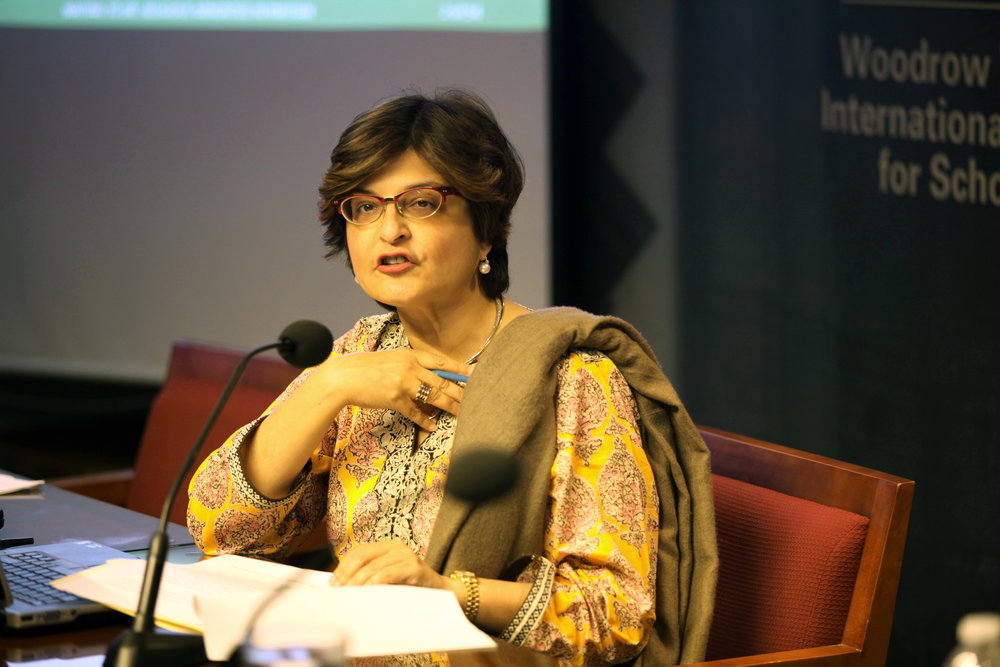‘Imran Khan’s desire to improve relations with Iran is good for regional stability’

TEHRAN - Pakistan has just given mandate to Imran Khan led Pakistan Tehreek Insaaf (PTI) to form the new government, albeit with the help of other smaller parties. Despite controversies surrounding the election outcome, Imran Khan is all set to take oath as the new Prime Minister of Pakistan later this week. The new government faces many challenges in terms of domestic issues and foreign policy.
Farahnaz Ispahani is a Pakistani politician and former Member of the Parliament (MP). She served as Media Advisor to the President of Pakistan from 2008 to 2012. She is currently Global Fellow at the Woodrow Wilson Center, Washington and is the author of the book ‘Purifying the Land of the Pure: The History of Pakistan’s Religious Minorities’.
In an interview with Tehran Times, she spoke about the political transition in Pakistan, the challenges for the new government, Imran Khan’s foreign policy matters, Pakistan’s relations with Iran and the U.S. and why parties like PML-N and PPP will bounce back.
Following are the excerpts:
Q. Imran Khan is all set to become the new prime minister of Pakistan. What are the biggest challenges before his government?
A. The biggest challenge facing Pakistan today is the economy. We need both immediate and long term relief. Saudi Arabia and China are reported to have offered monetary help to the tune of $8 billion and $2 billion respectively and a new International Monetary Fund (IMF) program is also being considered. Even if the IMF program is obtained it will involve onerous conditions. Pakistan needs to break out of its cycles of boom and bust but for that serious reform, not gimmicks and temporary solutions, are needed.
The United States, which has bailed Pakistan out repeatedly since the early 1950s, seems unlikely to help generously this time.
After the pressing economic issues, the nation must deal with the continued presence of extremist parties and terrorist groups. There were several terrorist attacks during the recent election campaign and religious minorities, both Muslim and non-Muslim, face increasing challenges.
Education, health and other social sector indicators show Pakistan to be lagging behind. To correct that downward trajectory we need good long term policies and resources to implement them. Neither of which we have had for decades.
Q. The general election was marred by accusations of vote rigging allegedly engineered by the military. Do you think Imran Khan had the backing of military?
A. Yes. Imran Khan and the PTI have had the backing of the Pakistan army and establishment which includes the judiciary. The restrictions on the media were at an all-time high.
Pre-poll rigging has been accepted by the Human Rights Commission of Pakistan, and the EU Election Observer team. Many Pakistani political parties, candidates, activists and media have reported election irregularities all over the country. So, proof of the engineered results exists. But, Mr. Khan also had his support base.
Q. In his campaign, Khan spoke about domestic issues like rebuilding institutions of governance and fighting corruption but he didn’t clearly outline his foreign policy. Do you think his foreign policy will be any different from his predecessors?
A. No. Mr. Khan has few foreign policy interests and no expertise or experience. However he had spoken in support of the Afghan Taliban and made some positive remarks about Pakistan’s allies Saudi Arabia and China. He has been largely anti-American in his past views.
The bottom line, however, is that the army controls foreign policy and they expect to continue to do so. If Khan steps out of line he will face the consequences like his predecessors.
Q. He also spoke about improving ties with Iran and playing a role in bringing Tehran and Riyadh closer. Is that going to happen?
A. The desire to improve relations with Iran is a positive one. Let us hope he can deliver that for regional stability. But he will have to tread carefully to not upset Pakistan’s other friends and benefactors.
As for acting as an intermediary, it’s highly unlikely that Pakistan can bridge serious and ongoing differences between the two Muslim countries. For that, the Iranian and Saudi leaders would have to find common ground themselves.
Q. Khan's biggest test would be America because he has been critical of Trump's foreign policy and has even supported Iranian nuclear deal. Do you think Pakistan has the best chance to come out of US shadow under him?
A. Pakistan’s foreign policy has always been directed by the Pakistani military and is destined to remain that way for the near future. The Trump administration has adopted a tough posture with Pakistan and Khan cannot change that posture without changing Pakistan’s policies on Afghanistan and terrorism. The course of Pakistan-Iran relations of course depends on the two states themselves.
Q. How do you see Pakistan's relations with China shaping up under the new government?
A. China is the biggest power player in Pakistan today. China-Pakistan economic corridor (CPEC) has ensured that. For the near future I see a further deepening of Pakistan-China ties.
Q. PML-N has lost the ground across the country, even in Punjab. PPP has been relegated to sidelines. Do you think it will be difficult for these two parties to comeback from here?
A. Politics and political parties rarely die out. I do see a continued role for both parties in Pakistan’s future.
